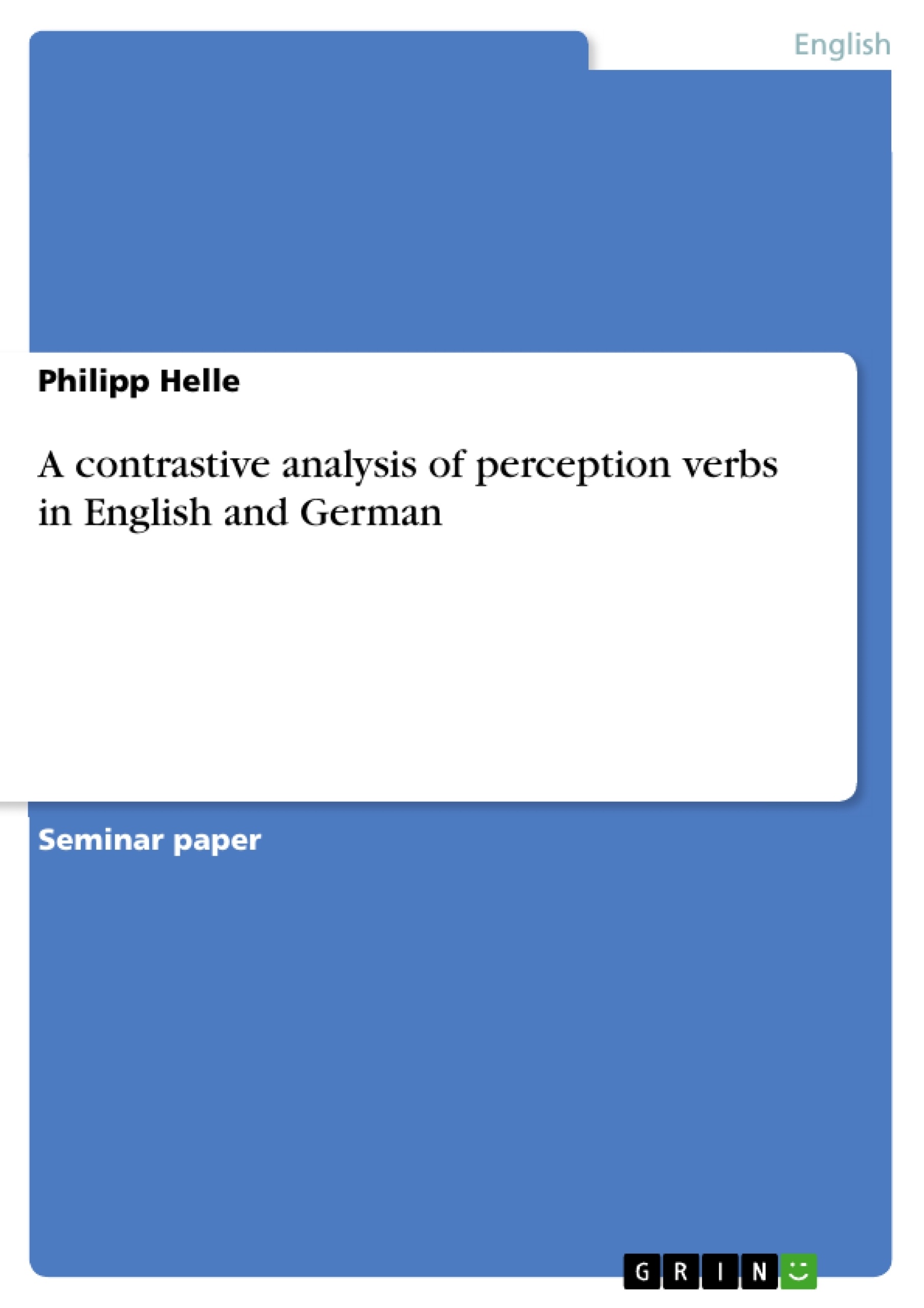An extensive number of studies deal with perception verbs and their complementation in English or in German but so far no study found, analyses the two languages with respect to perception verbs contrastively. This paper shall provide the basis for a contrastive analysis of perception verbs and their complements in English and German. The goal is to contribute to the comparative typological study of the two languages as well as to the typological study of perception verbs and perception verb complements cross-linguistically.
Table of Contents
- Introduction
- Perception Verbs
- Three Types of Perception Verbs
- Cognitive verbs
- Active verbs
- Descriptive verbs
- Summary
- Three Types of Perception Verbs
- Perception Verb Complements
- Finite Clause
- Declarative
- Interrogative
- Adverbial
- Non-Finite Verbal
- Full infinitive
- Bare infinitive
- Present participle
- Past participle
- Non-Verbal
- Adjective phrase
- Prepositional phrase
- Noun phrase
- Nominalized
- Summary
- Finite Clause
- Concluding Remarks
Objectives and Key Themes
This paper aims to provide a contrastive analysis of perception verbs and their complements in English and German, contributing to the comparative typological study of both languages and the cross-linguistic study of perception verbs. The analysis focuses on identifying and comparing the ways perception is expressed in the two languages.
- Classification of perception verbs into cognitive, active, and descriptive types.
- Analysis of the syntactic structures used to complement perception verbs.
- Comparison of the lexicalization of perception verbs and their complements in English and German.
- Examination of the semantic differences between cognitive and active perception verbs.
- Exploration of the role of the subject in perception verb constructions.
Chapter Summaries
Introduction: This introductory chapter establishes the need for a contrastive analysis of perception verbs in English and German, highlighting the lack of previous studies directly comparing the two languages in this area. It outlines the paper's objectives: to contribute to comparative typology and to the cross-linguistic study of perception verbs and their complements. The chapter also previews the structure of the paper, outlining the focus on verb types and complements.
Perception verbs: This chapter lays the groundwork by defining perception verbs and their relevance, referencing existing linguistic studies that support their universality across languages. It introduces the three main types of perception verbs—cognitive, active, and descriptive—as categorized by Rogers (1971), setting the stage for a detailed examination in subsequent sections. The chapter emphasizes the importance of perception in daily life and provides evidence for the universality of perception verbs based on Viberg’s study.
Perception Verb Complements: This chapter delves into the various types of complements that follow perception verbs, categorizing them as finite clauses (declarative, interrogative, adverbial), non-finite verbal complements (full infinitive, bare infinitive, present participle, past participle), and non-verbal complements (adjective phrase, prepositional phrase, noun phrase). It also addresses nominalized complements. The chapter systematically analyzes the grammatical structures and semantic nuances associated with each complement type in both English and German, aiming to highlight the contrastive features between the languages.
Keywords
Perception verbs, contrastive analysis, English, German, cognitive verbs, active verbs, descriptive verbs, verb complements, finite clauses, non-finite verbs, typology, cross-linguistic study.
FAQ: Contrastive Analysis of Perception Verbs in English and German
What is the main topic of this paper?
This paper conducts a contrastive analysis of perception verbs and their complements in English and German. It aims to contribute to comparative typological studies of both languages and the cross-linguistic study of perception verbs in general.
What are the key objectives of this research?
The research aims to classify perception verbs into cognitive, active, and descriptive types; analyze the syntactic structures of perception verb complements; compare the lexicalization of perception verbs and their complements in English and German; examine the semantic differences between cognitive and active perception verbs; and explore the role of the subject in perception verb constructions.
What types of perception verbs are discussed?
The paper categorizes perception verbs into three main types: cognitive, active, and descriptive verbs. This classification, based on Rogers (1971), forms the basis for the analysis.
What types of complements are analyzed?
The analysis examines various complement types following perception verbs, including finite clauses (declarative, interrogative, adverbial), non-finite verbal complements (full infinitive, bare infinitive, present participle, past participle), and non-verbal complements (adjective phrase, prepositional phrase, noun phrase). Nominalized complements are also addressed.
How does the paper compare English and German?
The paper provides a contrastive analysis, highlighting the similarities and differences in how perception is expressed in English and German. This includes comparing the grammatical structures and semantic nuances associated with each complement type in both languages.
What is the structure of the paper?
The paper includes an introduction, a chapter on perception verbs (defining and categorizing them), a chapter on perception verb complements (analyzing their different types), and concluding remarks. A table of contents provides a detailed overview of the sections and sub-sections.
What is the significance of this research?
This research contributes to the field of comparative typology and cross-linguistic studies by providing a detailed comparison of perception verb usage and structure in English and German, an area previously lacking in direct comparative studies.
What are the key words associated with this research?
Key words include: Perception verbs, contrastive analysis, English, German, cognitive verbs, active verbs, descriptive verbs, verb complements, finite clauses, non-finite verbs, typology, cross-linguistic study.
What prior research is referenced?
The paper references the work of Rogers (1971) for the classification of perception verbs and Viberg’s study on the universality of perception verbs.
Where can I find more detailed information on each chapter?
Chapter summaries are provided in the document, outlining the key content and focus of each section (Introduction, Perception Verbs, Perception Verb Complements).
- Citar trabajo
- Philipp Helle (Autor), 2006, A contrastive analysis of perception verbs in English and German, Múnich, GRIN Verlag, https://www.grin.com/document/56260




